What future is there for the European Commission within the big redefinition of the Transatlantic Relationship?
(excerpt from the GEAB bulletin 107 / September 2016)
Since its creation, the Global Europe Anticipation Bulletin has been designed among other things to inform European public opinion and decision makers about the fact that the global geopolitical reconfiguration vitally requires a profound change of the EU. The United States, structural associate of the European project since its origin – but mostly since the fall of the Berlin Wall – has also changed its role and place in the world. And now, with the global systemic crisis, its transformation emphasises even more the EU’s urgent need to adapt; in terms of its nature, purpose and external relations. But most of all, its need to reform its most emblematic administrative body, the European Commission.
Visible Deterioration of the Transatlantic Relationship
A period of thirteen years will have passed since the Franco-German refusal to follow the US in its Iraq war in 2003[1] until the “possibility of Trump” for the US presidency at the end of 2016. In the meantime, the transatlantic relationship has witnessed all kinds of hazards: starting with great moments of apparent symbiosis (Sarkozy’s election as head of the most anti-Atlanticist EU countries in 2007; the communion against Russia in 2014) and ending with deep questioning (NSA’s spying scandal[2] and anti-TTIP campaigns[3]).
Nevertheless, we currently see some of the rupture indicators intensify, which question several particularly fundamental points of the transatlantic relationship. Here are the most common:
. the action taken against Barroso in response to his hiring by Goldman Sachs: Barroso was a president of the European Commission known as blindly and unconditionally pro-Atlanticist. He was hired by Goldman Sachs which was notoriously responsible for the misleading investigation of the Greek debt case in 2002, as part of the decision to integrate the country into the Eurozone[4]. Some time ago, this kind of scandal could have been missed; but this time, not only has the media jumped on the topic, but also the Commission has reacted by withdrawing Barroso’s privileged entry access as a former president[5]; a group of officials even signed a petition entitled “not in our name”[6].
. the implementation of reciprocal visas between North America and the EU: by applying the EU principles of solidarity, the European Commission has hardened its stance with the US and Canada, which still keep their visa policy for citizens of certain EU countries; the Commission has threatened to implement a reciprocal measure by asking for visas from US and Canadian citizens travelling to Europe. Last July, a six-month period was given for the US and Canada to remove visa requirements for all EU countries; or a measure of reciprocity would be applied[7]. We will see how things settle by the end of this year. It appears that the EU, via the European Commission, has decided that it will no longer be pushed around by its North American allies.
. the simultaneous statements made by Gabriel (DE) and Hollande (FR) in an attempt to bury the TTIP: This summer, the German Minister of Economy, Sigmar Gabriel, and the French President, François Hollande, made several statements converging on the fact that the TTIP was stillborn and that negotiations had to stop. This led to certain acrimonious exchanges between Hollande and Juncker (current president of the EU Commission)[8].
. the reactivation of European Defence project[9], following Turkey move away from NATO. Earlier this year, our team anticipated the end of NATO. The Alliance is now in a poor condition, especially since Erdogan has: restored order in his army[10] (NATO’s largest army by number after the US[11]); restored good relations with Russia[12]; and turned his back to the EU[13], the final chapter of a long strategic history of transatlantic relations. With NATO on the ropes, the EU can launch its project of European Defence.
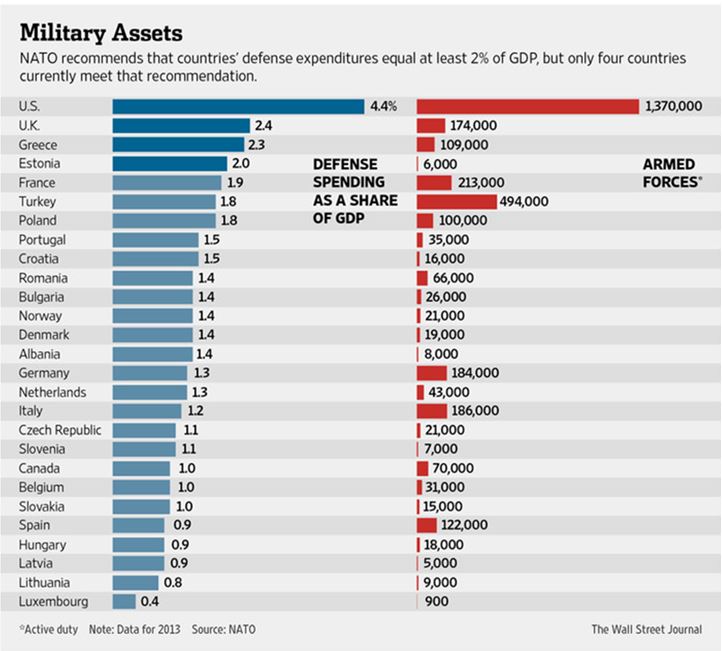
Figure 1: Military expenditures of different countries. Source: WSJ
. the questioning of the tax exemption for major US multinationals in Europe, recently symbolised by the case against Apple. The 13 billion euros of back taxes demanded by the European Commission from Apple form part of an internal strategy to give back to the continent its revenue-raising capacity. But everyone must have figured out by now that the US government was also the target with Apple providing the means[14]. This is part of a reciprocal measure for the astronomical fines imposed by the US government to several European banks[15]. More broadly, all this is part of a deep questioning of the benefits tacitly acquired by the United States through the “unconditional one-way road” of the transatlantic relationship.
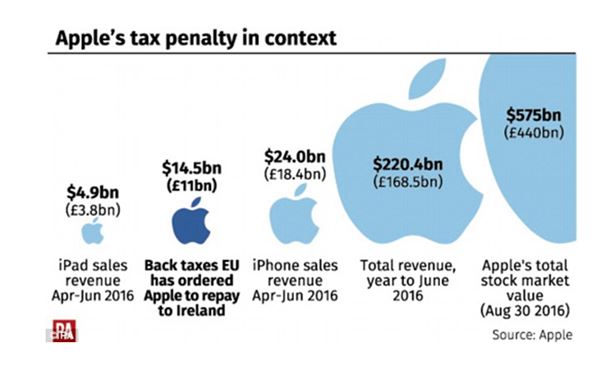
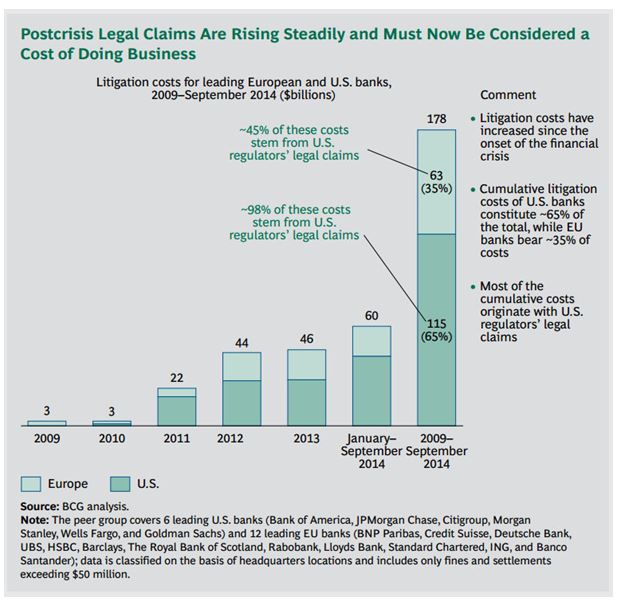 Figure 2: Up, Apple’s tax fine vs its revenues (source: Dailymail). Down; legal claims cost and fines paid by the banks (80% of the total came from the US), 2009-2014 (source: BCG).
Figure 2: Up, Apple’s tax fine vs its revenues (source: Dailymail). Down; legal claims cost and fines paid by the banks (80% of the total came from the US), 2009-2014 (source: BCG).
Brexit and “Trump possibility / Hillary probability” at Work Behind this Weakening
Two factors converge and contribute to the acceleration of Europe’s “release” from America:
. what we call a “Trump possibility”. Prior to Trump’s possible election to the head of the US in November, the EU (and the rest of the world) needs to realise that the No 1 world power is now capable of electing such a leader. Added to this “Trump possibility”, there is the worry (which is somewhat less visible) shared by Europe[16], and even the US[17] and the rest of the world of the “Hillary probability”. The outlook on the upcoming US presidential election cements the rupture of the ties which held together the two sides of the Atlantic.
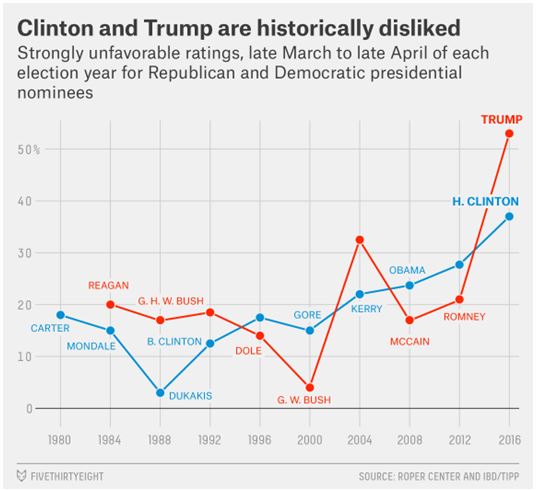
Figure 3: Unfavourable ratings March-April, Republicans vs Democrats, 1980-2016. Source: Roper centre.
. Brexit: The UK, which has provided the US with a way to influence decisions and reflect its political strategies in Europe for thirty years[18], has now removed itself from the EU. That said, our team estimates that by leaving the EU, the UK also releases itself from the role given to it by the United States (which became structural and recently challenged by its new alliance with China[19]). It is not only the EU that frees itself from American influence by losing the UK, but also the UK releases itself from US tutelage, by exiting the EU.
What Impact on the Old EU?
Thus, we begin to think that the EU’s current difficulties may be more related to the growing difficulties in the transatlantic relationship than we might previously have imagined. One hypothesis stands out: would the EU, and at its core the European Commission, resist any EU-US decoupling?
For the EU, the answer is already on the table: Brexit has sealed the fate of the “post-fall of the Wall” version of European construction project. The EU decision-making system has stopped and the European construction project retakes its regular course under the form of a multitude of European meetings (EU-1, Euroland, Schengen, Club Med, Group of Weimar, Visegrad, Franco-German + Italy Engine)[20]. The EU technically died on June 23rd, but the European construction project has never been more dynamic in the last thirty years.
What about the European Commission? Will it manage to adapt to the new complexity of a multi-format and multi-speed European model? And will it be able to change its profoundly transatlantic nature that it developed since the fall of the Wall[21]?
If the Apple case shows signs of optimism, we must still note that the Commission can only move on with this case because Apple’s lobbying office in Brussels did not do its job properly[22]. This seemingly innocuous fact says a lot about the trans-European decision-making system. Will the Commission have enough maneuver space to get through this transition?
Regarding the TTIP; it is clear that the European Commission, despite increasingly loud calls from high level European leaders (such as Sigmar Gabriel and François Hollande), it does not question the negotiations over the TTIP. In doing so, it sticks to the operating rules of the Community by ensuring that it continues with the mandate it was given by the 28 members. So it is normal that the Commission continues its work on the topic. Moreover, TTIP obliges politicians as well as citizens to ask questions about the European decision-making system and the existence or not of “circuit breaker” mechanisms. We know that decisions usually take a long time at Community level; now we know that they take at least the same amount of time to stop. This feature is less compatible with the degree of responsibility the European level has, especially in a crisis which forces everyone to be reactive. It is therefore quite probable that the TTIP will be the one to ultimately bring the Europeans to initiate a profound reform of the decision-making and operational mechanisms of the European Commission.
TTIP and Russian Sanctions: Two Stumbling Blocks
Another case may generate an even deeper questioning of the Commission: Russian sanctions. In this respect, important countries are increasingly insistent that the sanctions are lifted: France[23], but also Germany[24], Belgium[25] and Italy[26] all wish this. Our team has already anticipated that negotiations related to the lifting of sanctions were focusing towards the end of 2016[27]. Nonetheless, nothing predicts their future success. The Baltic countries, as well as Poland, are not ready to agree on the lifting of the sanctions, at least not yet. Moreover, the announcement of a European Defence strategy reassures them about Europe’s capacity to defend them against possible attempts of Russian invasion. Yet, the pro-NATO agendas of these countries could ‘say the word’ and block the decision over the formation of a European Defence.
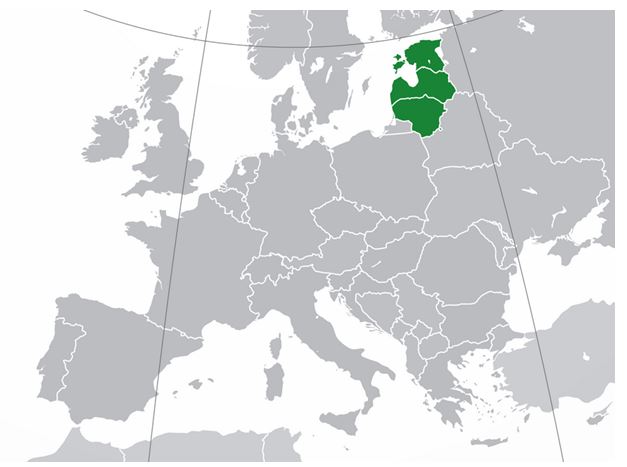
Figure 4: Baltic States: Latvia, Lithuania and Estonia, 7 million inhabitants in total. Source: Wikipedia
Imagine now a Trump or a Clinton president, instead of Obama. Beyond the very negative impact of Russian sanctions on the European economy, could Europe really run the risk of being tied to the US agenda vis-à-vis Russia? Or should it absolutely disengage and ensure its strategic independence? If you agree with our team that the second option is correct, you will then agree that a blockade made by four EU countries for a lifting of the sanctions will be unacceptable and bolster the conditions for a rupture within the current European operating model. And rather than attacking the Baltic States and Poland, it will be easier to invalidate the mechanism which gives them this extraordinary power, by subverting the legitimacy of the European Commission to implement such mechanisms. From this point of view, the use of “automatic renewal of sanctions” emphasises the technocratic character of the Euro-Russian crisis management, thus (just like in the case of the TTIP) forcing us to ask ourselves if there is a “stop button” anywhere nearby.
This shows to what extent the European Commission can be soon found under the spotlight as part of the many adjustments permitted by Brexit and imposed by the worrying future of the US presidency among other major constraints.
EU Administration: The Importance of Political Framing
The survival of the Commission relies on its ability to put itself (or not) in Euroland’s service, in Weimar Group’s, or in Schengen’s for that matter – in the citizens’ also. But how could this commission adapt to such a change without a political mandate? Europe is currently facing changes which are outside any treaties, squarely in the field of pure politics and outside any democratic mandate. In short, a challenge for any administration worthy of holding that title.
In reality, the future role of the European Commission could very well be reduced to the implementation of Brexit, the only domain of competence of a European Commission structurally serving 28 member states, at the time when it counts now 27. In the meantime, ad hoc secretariats would take over the implementation of decisions taken by each European body; creating a beautiful cacophony.
The weakening of the European Commission is a logical consequence of Brexit and of the redefinition of transatlantic relations. This weakening may even take the form of a violent debate by the end of 2017, as part of a change in ideology of certain key EU states, from pro to anti-EU populism. This is likely unless a democratic process to legitimise the political-level of the European Commission, the College of Commissioners, can be implemented.
This is an excerpt from the GEAB 107 / Sept. 2016
_______________________________
[1] Source: The Guardian, 22/01/2003
[2] Source: Express.co.uk, 27/10/2013
[3] Source: « Anti-TTIP petition signed by 3 million », Euractiv, 09/11/2015
[4] Source: Der Spiegel, 08/02/2010
[5] Source: Financial Times, 11/09/2016
[7] Source: Bloomberg, 13/07/2016
[8] Source: Die Welt, 308/2016
[9] The EU Summit in Bratislava brought into discussion and concluded upon a common will to create a European Army, outside of NATO. Source : The Telegraph, 06/09/2016
[10] We need to remind here that Erdogan took power in 2003, with an agenda clearly mentioning the minimised role of the army in his country. The Syrian crisis (2006) derailed this political project and, durinhg three years, power went back to the Turkish army. The military coup which we predicted in GEAB bulletin of October 2014 (source: GEAB N°88), allowed Erdogan to calm the Turkish army’s impulses. We recommend all our readers review earlier GEABs about Turkey and our anticipations – which looked erroneous, but have since been validated by the recent military coup.
[11] Source: TheNews.pk, 17/07/2016
[12] Reestablishment of relations… and all the follow up: gas pipelines, airlines, etc. Source: AzerNews.az, 08/08/2016
[13] Source: Hürriyet, 21/04/2016
[14] The US has officially tried to block the EU’s demand related to Apple… but in vain. Source: The Guardian, 24/08/2016
[15] Source: Financial Times, 14/11/2014
[16] The notorious « neo-conservative » agenda of Hillary Clinton worries everyone, almost as much as the « unpredictability and populism of Trump ». Sometimes more. See for example a documentary about Hillary Clinton shown on July 13 on a high ranked TV channel, Arte. Source: Arte, 13/07/2016
[17] 56% of American citizens are « afraid of » seeing Trump at the head of their country… but 48% of Americans are as much afraid of a Clinton victory. Source: The Hill, 14/07/2016
[18] Read this article: nationalinterest.com, 24/02/2016; The Conversation, 24/06/2016
[19] Further to Brexit, LEAP has taken the observer role and is now watching if the UK confirms its rapprochement with China or, on the contrary, comes back to its old transatlantic love. The recent decision of validating the nuclear plant project at Hinkley Point encourages us to support the first hypothesis. Sources: The Interpreter, 04/11/2015; BBC, 15/09/2016
[20] See later in this issue a little article on this topic.
[21] This evolution is coming from a series of convergent factors centring around Brussels after the fall of the Wall: interpretation of the fall as a victory of the American camp; Brussels’ strong anglophile nature for almost 20 years, having brought in a flow of more Anglophone than European advisors; placement of ultra-pro-Atlantist eminence grises in strategic positions inside the European Commission (for example, David O’Sullivan, currently the EU Ambassador to the US, former Secretary General of the Commission, Lady Ashton’s Number Two during the EEAS and the Euro-Russian crisis); 10 years of Barroso at the head of the EU administration. Considering these factors, the US has kept the EU in its hands for a decade. If this influence is diminishing, it does not mean that the EU Commission and Brussels do not keep their status as being the last strongholds of the pro-Atlanticism in Europe; at a time when there are so many things to do at the European level to create a new transatlantic relationship founded on equality.
[22] Source: Politico, 31/08/2016
[23] Source: USA Today, 08/06/2016
[24] Source: Der Spiegel, 30/05/2016
[25] Source: USA Today, 24/07/2016
[26] Source: Politico, 12/010/2016
[27] Source: Financial Times, 09/06/2016




Comments